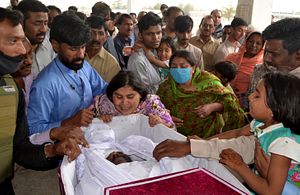On Easter Monday, four members of a Christian family were shot dead in Quetta, the capital of Pakistan’s volatile Balochistan province. The attack was claimed by the Islamic State (ISIS) in a press statement issued by the jihadist group.
The very next day, a Pakistan Army spokesperson “categorically” denied the presence of ISIS in the country, choosing instead to extol his organization’s performance by saying that “the security situation in the province [Balochistan] has improved owing to the collective efforts of civil and military leadership.”
The day after a family had been massacred in a provincial capital, the media representative of the most powerful state institution preferred to play his own broken record. Amidst continued human rights abuses in that very province, orchestrated by that very institution, he chose to suggest that the perpetrators of the latest act of terror don’t even exist.
The insensitivity of state and its representatives toward the locals of Balochistan, religious minorities, or indeed human life, isn’t anything new. What is more damning is the continued denial of the presence of the most high-profile terror group in the world, which has found an escape route into the Af-Pak region after being battered out of the Middle East.
This is especially perilous considering that Monday’s attack is the second time in four months that the same terror outfit has targeted the same religious community, in the same city. Last December’s bomb and gun attack jolted Quetta’s Bethel Memorial Methodist Church a week before Christmas, killing eight people.
In November, a suicide bombing had targeted a paramilitary convoy, and another bomb killed two police personnel in two separate incidents. While neither of these attacks was claimed by ISIS, the month prior the group targeted a Sufi shrine in Jhal Magsi, 400 kilometers east of Quetta, killing 20.
This was the second time a shrine was targeted by ISIS last year. The Sehwan bombing in February 2017 killed 88 – the deadliest attack since 2014.
In Quetta alone, in little over three months this year, 11 terror attacks have taken place, four of which have been claimed by ISIS or have the group’s suspected involvement. This includes the March 4 and April 1 killings of Hazara men from the Shia community, which has been regularly targeted by ISIS.
This is the ground reality in just the capital of the Balochistan province in the past three months, while the Army claims that the “security situation has improved.”
Statistically, terror incidents are indeed on a decline in the rest of the country – which still puts Pakistan fifth on the Global Terrorism Index – but Balochistan remains volatile, amidst separatist militancy, the Army’s operations, and the two-pronged jihadist struggle to take over the province, spearheaded by ISIS and the Pakistani Taliban.
This tug-of-war engulfing Balochistan is an ideal scenario for ISIS, whose Khorasan faction overlapping the Af-Pak region – including the province’s border region – has now been functional for over three years.
The counterclaim against Islamic State’s presence in Pakistan is founded upon one argument that claims that the group’s core body is not in the region. According to this argument, the attacks claimed by the outfit are conducted by local militants who exaggerate their affiliation with the Islamic State, which duly fans these assertions in a bid to self-aggrandize its global reach.
Ironically, it is this very counterargument that makes ISIS an unprecedented jihadist threat. It provides the umbrella for small jihadist groups or individuals, who often may not be operationally accessible to the group’s core, to launch attacks in its name, embracing the Islamic State’s agenda of establishing a global caliphate.
This is how the Islamic State’s spread in Pakistan has been aided by the “global wings” of local sectarian outfits like the Lashkar-e-Jhangvi, and the Taliban factions that have disintegrated from the Tehrik-e-Taliban Pakistan (TTP). Among these is the Jamaat-ul-Ahrar, which like many other Taliban subgroups has gravitated toward ISIS, seeking a global jihadist umbrella.
This is precisely why attacks attributable to the Islamic State of Khorasan doubled last year. Even though most of them were orchestrated on the other side of the Durand Line, a security report by the Pakistan Institute for Peace Studies (PIPS) says footprint of ISIS in Balochistan and northern Sindh is increasing, where it “killed 153 in 6 deadliest attacks” last year.
With ISIS attacks rising, especially in Balochistan, the Pakistani state and its security establishment would be best advised to launch a counterterror operation designed specially to counter the ISIS narrative, which remains the group’s greatest arsenal in its successful wooing of religiously motivated militants.
This week’s Quetta attack is a gory reminder of Islamic State’s presence in Pakistan – and its continued war on non-Muslims and minority sects within Islam.

































